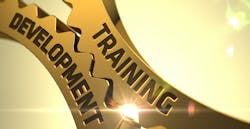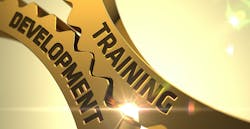Skilled Trades Need Effective Training Cultures
As home service companies' needs and expectations evolve and technology changes rapidly, training for skilled trades workers becomes increasingly urgent. It’s a conduit that enormously impacts recruiting and retention, productivity, efficiency, culture, and profitability and can create a positive feedback loop that drives growth.
With the tight labor market for field service and skilled trades industries, employers must increase productivity with the same number of people. When skilled workers are trained, educated, and well-informed, their value to the company increases. That value is measured in increased revenue, fewer callbacks, higher completion rates, and, ultimately, increased profitability. As the company's profits increase, they can invest in things that make them an employer of choice in their market – competitive wages and benefits, as well as training and educational opportunities that set team members up to succeed.
The positive impact that training can have on service companies starts in the recruiting process. Candidates, especially younger ones, want to know that educational opportunities are available. No one wants to be stuck in a dead-end job. They want to know they can continue improving and advancing in the company.
'Successful training is built on a culture that values its entire team. Companies that invest in consistent, high-quality training generally see higher job satisfaction among team members.'
Home service businesses that openly discuss and promote training and educational opportunities don’t just attract the best talent; they retain them, too. It’s an investment in team members that employees can see and recognize. Without training, companies will struggle with recruiting and retention. With it, they can position themselves as an employer of choice.
Successful training is built on a culture that values its entire team. Companies that invest in consistent, high-quality training generally see higher job satisfaction among team members. They come to work happy every day and perform well because they enjoy what they do and know they have career options. Employees with high job satisfaction tend to be productive, efficient, and self-motivated. That benefits customers, who see better results and refer companies to their friends and families.
To see the positive ongoing impact that training can have, employers must recognize that it is evolving. Not long ago, most training for technicians meant sitting in a classroom for two days, listening to a lecture, taking many notes, and returning to work. For training to truly effect change, it must be engaging. It can’t be a one-way street. Encouraging participation – whether with workbooks, skills enhancement, role-playing, or breakout sessions – elevates learning retention and empowers students to share their newfound skills with co-workers.
Self-paced online learning and simulation training are crucial elements that enhance traditional in-person training. The flexibility offered by online and virtual or simulation training adds a new dimension to today’s offerings. Team members can quickly gain simulated hands-on experience in relevant, immediately applicable skills, using seasonal downtime to reinforce foundational training and consistently upskill.
Successful implementation of a training culture takes strategy. Effective training isn’t a one-time event. It’s an investment with a potential return that can easily outweigh the cost if done correctly. But employers have to see the big picture and put some thought into whatever training program they develop.
- How often do they want team members in training?
- Is the business seasonal?
- How much should they spend on training?
Owners and managers should get feedback from team members about existing training and what they want. Do they connect with the content and the trainers? Why or why not? What subjects do they want training in? With skilled workers, it’s essential to assess what team members know compared to where they should be. A training program should follow a logical progression that makes sense for that company and its team members.
Today, distributors offer more than just technical and installation training on their products for field workers. Many offer soft skills training to teach skilled tradespeople how to interact with consumers and provide upgrades and solutions to their problems.
This training demonstrates to technicians the power of offering solutions beyond a basic repair or service, helping build strong relationships and trust with the consumer and instilling confidence in techs. Those relationships, in turn, result in repeat customers who become long-term clients and keep the company busy year-round.
When I was in high school, I worked for a fast-food restaurant. It wasn’t a career for me, but I’m competitive, and I wanted to make a little more money. The company had a well-defined, predictable curriculum that let you know what to do to reach the next level. I knew the steps I had to take to advance myself.
It turns out that what I learned – how to manage inventory and staff during busy times – has been helpful throughout my career. But more importantly, it showed me the value of a consistent investment in employee training. Field service and skilled trades companies can learn the same lesson. A well-trained employee has an opportunity to shine within the company and contribute to a culture of respect and accountability that is increasingly central to success in our industry.
Candy Cunningham is the Distributor Relationship Specialist & Trainer for Business Development Resources (BDR), billed as the premier business training and coaching provider to the home service industry. Candy has over three decades of experience in HVAC, with roles in distribution sales and territory management. As a territory manager, she was recognized in the Top 10 Percent of National Distribution Sales on three occasions. Now an integral part of BDR’s training department, Candy leads training classes focused on maximizing results and guides distributors in building customer training journeys. Learn more about BDR at www.bdrco.com.


